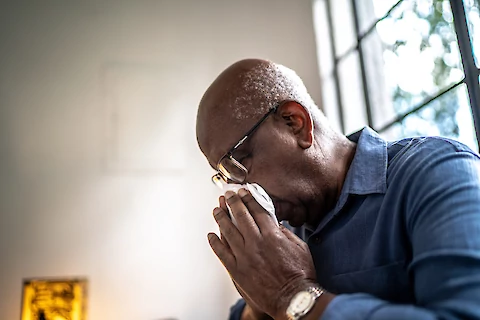
RSV, or Respiratory Syncytial Virus, may not be a household name like the common cold or flu, but it represents a serious health risk, particularly for seniors. As our loved ones age, their immunity weakens, increasing their vulnerability to diseases like RSV. Here's everything you need to know about this illness.
Understanding RSV
Respiratory Syncytial Virus, abbreviated as RSV, is a contagious virus known to cause respiratory tract infections. While the symptoms in younger people or those with robust health can resemble a common cold, in seniors, the symptoms can be more severe and may lead to serious health complications.
RSV spreads primarily through respiratory droplets from an infected person and can also live on surfaces, making it highly infectious.
The Risk of RSV in Seniors
Seniors are at an elevated risk of RSV due to their naturally declining immune system that comes with age, which means their bodies are less equipped to fight off infections. Additionally, older adults often have chronic health conditions such as heart disease or diabetes, which may weaken their immunity further and exacerbate the effects of an RSV infection.
It's not just the virus itself that's a concern. Serious complications can arise from an RSV infection in seniors, including pneumonia, chronic obstructive pulmonary disease (COPD) exacerbations, and in severe cases, hospitalization or even death.
Preventing RSV Infection in Seniors
The good news is, that there are measures seniors can take to minimize their risk of contracting RSV, including:
Good Hygiene
Practicing good hygiene is the first line of defense. Regular handwashing, especially after touching communal items or surfaces, can limit the spread of the virus. Disinfecting frequently touched areas and items, such as doorknobs and mobile phones, is another beneficial habit.
Avoid Contact
Avoiding close contact with people who are sick is crucial. RSV spreads easily, so even brief exposure can lead to infection. It's especially important during the winter months when these viruses are most prevalent.
Vaccinations
Another critical step is to discuss vaccination options with healthcare providers. While there isn't a specific RSV vaccine currently available for adults, vaccines for similar diseases, such as the flu or pneumococcus, can help bolster overall immune health, providing indirect protection against RSV.
The Role of In-Home Caregivers in RSV Prevention
In-home caregivers play a critical role in protecting seniors from RSV. They can aid in maintaining a clean environment, reminding seniors of good hygiene practices, and facilitating necessary medical appointments.
Caregivers are also invaluable at monitoring for early signs of RSV, such as runny nose, coughing, or decreased appetite. Catching these symptoms early can lead to prompt treatment, reducing the risk of severe complications.
Senior Helpers Grapevine Lake Helps Seniors Remain Healthy
RSV may not be as well-known as other viruses, but its impact on seniors can be significant. Armed with knowledge and preventative strategies, we can help protect our senior loved ones from this disease.
If you're looking for additional support, consider Senior Helpers Grapevine Lake. Our team is dedicated to enhancing the quality of life of seniors in Flower Mound, Dallas, Bedford, Colleyville, and Roanoke. Reach out today to learn how we can help keep your senior loved ones safe from RSV and other potential health risks.